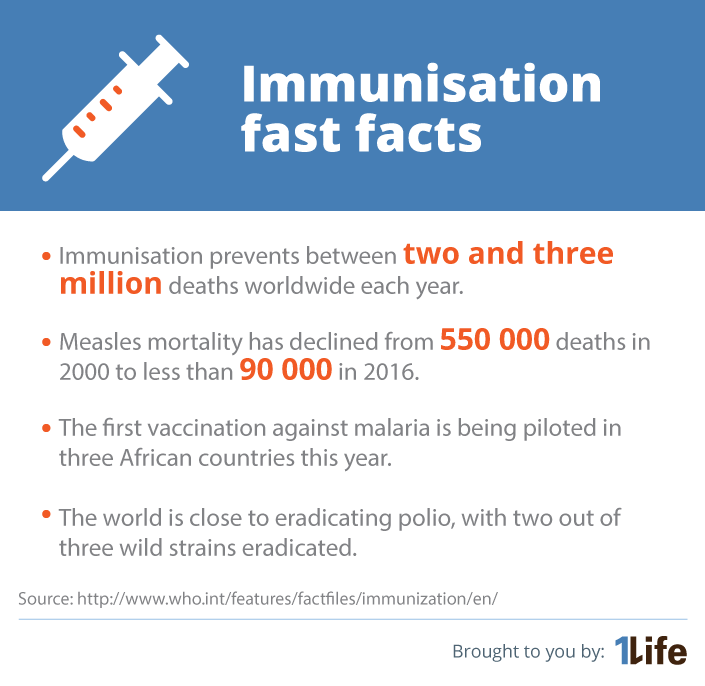While vaccinations are a big thing in your life when you have kids and you have to keep track of their inoculation schedule, it’s easy to forget that adults sometimes need vaccinations too. This isn’t always as straightforward as the kiddies’ schedule, so we spoke to Joburg GP Dr Isabel Thompson and prepared this handy guide to when you should consider adult vaccination.
When your own childhood vaccinations were incomplete or need a boosterMost adults think that their childhood vaccinations give them lifelong immunity, but this often isn’t the case - as they find out to their detriment when they get mumps at 40!
Just like kids need boosters, adults also need vaccination “top-ups” after the years have gone by. Vaccination schedules these days include new vaccines for infectious diseases like chickenpox, which might not have been available when you were a child.
This doesn’t mean you should immediately dash out and have the full baby and toddler vaccination schedule
This doesn’t mean you should immediately dash out and have the full baby and toddler vaccination schedule. Rather visit your GP and discuss your concerns (it’s great if you can track down your immunisation card and take it with you) and take their advice based on your health and likelihood of exposure.
When you want to have a babySome infectious diseases, while not particularly serious for adults, can pose a severe risk to unborn babies. Rubella is the most dangerous of these, so for this reason, doctors will recommend a test for IgC antibodies before you fall pregnant, to determine whether you are immune to this disease.
Isabel explains that you can either be immune as a result of prior vaccination or because you had rubella as a child. If you are not, they recommend having an MMR (which inoculates you against measles, mumps and rubella) a month before trying to fall pregnant, so that there is no risk to your baby.
If you are already pregnant, it’s still worth having the IgR blood test, even though you can’t have the MMR while pregnant, so that you know whether or not you need to be extra vigilant around possibly infectious children.
When you’re going to be living in close quarters with other peopleFor anyone who is joining the army or going to live in a boarding school or university res, or any other location where they’ll be living in close proximity to lots of other people, Isabel recommends having the meningococcal vaccination to avoid contracting meningitis. This severe bacterial infection causes inflammation of the membranes that cover the brain and spinal cord, and is most common among people living in shared residences.
When you are going to travelThere are a wide range of vaccinations required for travel to certain areas. It’s always best to speak to a travel agent, do online research or call a travel clinic such as the Sandton Travel Clinic for advice. If you do not have the necessary vaccinations for entry to certain countries, you will not be allowed to board the plane.
These are some of the vaccinations that could be required for travel:
- Yellow fever (for travel further into Africa)
- Hepatitis A (immunoglobulin)
- Cholera
- Polio
- Tetanus
- Typhoid
When you are over 65As people age, their immune systems decline, and are less efficient at fighting off infections. For this reason, the following vaccinations are often recommended for people over 65:
- The pneumococcal vaccine
- The flu vaccine annually
- A chickenpox vaccination
- Tetanus immunisation, which begins in childhood, should be re-administered every ten years. Even if you have skipped a few boosters, be sure to get one when you turn 65.
When you don’t want to get fluDoctors recommend that everyone, young and old, gets a flu vaccination every year. Flu is not a mild infection and can make you extremely ill with lasting repercussions. Your yearly jab is your best chance of avoiding flu, and it doesn’t come with any risk of you contracting the virus.
When you want to avoid contracting HPVIn South Africa, the HPV vaccination is recommended for prevention of infection by the human papilloma virus, which causes cervical cancer in women, and anal and throat cancer and genital warts in men and women. The schedule recommends two doses of the vaccination for children between nine and 14, and three doses for teenagers over 15. Because this vaccine was only introduced in South Africa in recent years, there are many young adults who are not yet vaccinated. Gardasil, the vaccine, is approved for men up to the age of 26 and women up to the age of 45. Speak to your GP or gynae about whether it is advisable.
Isabel points out that it is vitally important that vaccinated women still go for regular PAP smears.
When you’ve had your spleen removedWhile this applies to only a very small portion of the population, Isabel says that she is surprised to find that there are patients who have had their spleens removed who have not been vaccinated against the organisms that contribute to post-splenectomy sepsis. Such patients should discuss the best course of treatment with their doctors or surgeons, as their immunity will have been compromised by the procedure.
Here’s to your continued good healthVaccinations are considered to be the greatest achievement in medical science, but not following the schedule can compromise your immunity. Be sure that you are aware of your personal risk factors and the vaccinations you have had so that you can continue to receive full benefit from this life-saving medical intervention.





